- Home
- Richard F. Weyand
Galactic Mail: Revolution! (Childers Universe Book 3) Page 2
Galactic Mail: Revolution! (Childers Universe Book 3) Read online
Page 2
“That is a tremendous achievement by itself. In the thirty years I served in the Commonwealth Space Force, we fought no fewer than two major wars and literally hundreds of incursions. While the CSF was largely successful in repelling such incursions, among the Outer Colonies, the number of incursions was much larger. The death toll of all these incursions is impossible to know, but surely ran into the tens of millions. The human toll of the destruction of infrastructure in poverty, disease, and misery can only be guessed at.
“That was in a mere thirty years. Yet, in the fifty-some years since we started Galactic Mail, there have been no successful incursions, by anyone, anywhere. In truth, there have been very few attempts, given that the existence of Galactic Mail doomed them to failure. By now, most star systems have forsaken the study and practice of interstellar war, and, having seen more than my share, I can say that has been a very good thing.
“And I would like to keep it going.”
Childers picked up her tea and sipped it, while looking out at the New Hope of her time. When she had collected her thoughts, she set the tea down, turned back to Patricia Dawson, and continued.
“There are two primary dangers to Galactic Mail. One is external, that some system will stumble upon some new military technology that would make Galactic Mail vulnerable to being countered and allow that system to take up war on its neighbors with impunity. We have taken steps to forestall that eventuality, by instituting research within Galactic Mail to continue to sharpen its technology over time. We hope that, with the resources it has available, it can maintain its lead for quite a while. The estimates put it quite a few hundred years into the future, assuming Galactic Mail maintains its research posture and doesn't dissipate its resources on other adventures.
“The second danger is internal, that, having achieved its purpose, Galactic Mail will look for new problems to solve, other activities it can undertake to better the human condition. This is a great danger. Allow me to explain why.
“Human beings are messy creatures. We have all sorts of impulses and desires and motives, not all of them noble or honorable or benign. Anything but. That is the human condition. It is not solvable. We set out with Galactic Mail to close off the one worst aberrant behavior of the human race, death and destruction on a massive scale, through war on our fellow man. To have achieved that, to the extent we have, is remarkable.
“But the temptation will exist to solve other problems. In the end, to solve all other problems. This will arise from the noblest of motives, but it is wrong-headed, for two reasons.
“The first is that, in doing so, Galactic Mail will take its eye off the ball, dissipate its energies, will not remain adept and skilled at its primary purpose, maintaining a moratorium on war. War is the great leveler, it tears down everything, reduces humanity to its most basic impulses, and opens the door to every possible evil. Famine, plague, genocide, and worse. Take it from a lifelong student of war, that the abolition of war is the one great accomplishment. All others are secondary.
“The second reason is more subtle. While our basic humanity aches to help the poor, the hungry, the ill, the oppressed, when such efforts are centralized, a great truth emerges. Altruism doesn't scale well. In fact, such efforts usually end very badly. Dependence destroys independence. It is such a truth that it is built into the language.
“For these reasons, in our effort to rid humanity of the one great evil of war, we left many smaller evils alone. Over time, many of these smaller evils will be solved on a smaller scale, once the disruption of war is removed. The great tyrannies often resulted from the dislocations of war. Without the presence of war, over time they dissipate. That is our belief and our hope.
“But it is a slow process. The temptation will naturally arise within Galactic Mail to solve such problems more quickly, to step into the internal politics of star systems, ultimately to use its tremendous military power to force its solutions on individual star systems.
“What one ends up with then is a galactic central government.
“Uniting all of humanity under one government would be a tremendous mistake. Sooner or later, even the most benevolent and well-intentioned government can be corrupted, turn to despotism. To where, then, would one flee to escape it? From what outside point could one oppose it? Humanity would sink into millennia of tyranny.
“We decided the possibility – more, the likelihood – of tyranny on individual planets was a lesser evil than tyranny on the grand scale, across all of humanity. Galactic Mail is structured to prevent a galactic government from forming, as long as it does not become one itself.
“But we believe it will, or at least it will try.
“It is for this reason that you watch. It is your great responsibility.”
Dawson paused the recording. She looked out over the older version of New Hope absently.
Sitting here on this porch with her tea and her blanket, almost a hundred years old, and looking out over the small town New Hope was at the time, Grandma Childers spoke of these huge issues – galactic issues – so matter-of-factly. While heading up a navy of millions of people protecting thirty-three star systems, she herself had created Galactic Mail even while expecting it to try to become a galactic government.
She had understood that Galactic Mail would try to become a government for all the best of reasons. To take on other human issues, solve other human problems, setting the stage for tyranny by trying to be all things to all people, the solution to every ill.
She had spoken just as matter-of-factly about two dozen people taking it over, reconstituting it around its core mission. The most powerful organization humanity had ever created, ensuring the peace among what were now tens of thousands of inhabited planets. Against all this she ranged two-dozen people.
Dawson thought about that little old lady, the changes she had wrought, how they echoed across the years, the centuries, and how she had seen the future, and prepared against it. Dawson felt suddenly inadequate to the task.
My God. What have I gotten myself in for? she thought.
Allies
Dawson checked the time in the VR control panel. She still had time to get down to the gym for her workout before the kids got home. She stopped the simulation and was back in reality, in her office, in their home in suburban New Hope. She headed for the bedroom, shedding her clothes on the way.
As she dressed in her gym clothes, she continued to ponder the vast forces at work in the world around her, unseen and, before her assignment as a Watcher, unknown. Grandma Lieber had carried this burden for seventy years. No wonder she had sighed when Dawson sent the mail.
As she was doing her warm-up stretches, she saw George Enfield sparring Enshin on the mats. They were wearing helmets, and pulling their punches. Enshin karate was a full-contact style, but not for sparring. Half judo and half karate, Enshin was popular on Horizon, likely because it had been popular in the Commonwealth Space Force, and a lot of CSF people had retired here, either at the time of Horizon's founding or after.
Enfield looked to be about ten years older than her, in his late thirties. Dawson knew he was a distant cousin, in the family line of Margaret Childers Campbell, Jan Childers' other child. Dawson had never sparred with George, but they knew each other a bit from seeing each other at the gym. Now, though, a thought struck her.
As Enfield came by on the way to the water fountain, Dawson struck up a conversation.
“Hi, George.”
“Oh, hi, Patty.”
“George, you're my nth-cousin or something, aren't you?
“I think so,” George said. “My seventh great grandparents were Jan Childers and Bill Campbell.”
“Mine, too. That would make us what? Like eighth cousins or something?”
“That sounds right.”
“And we're both into Enshin. Isn't that weird?” Dawson asked.
“My great grandfather encouraged me to take it up when I was a teenager. I really enjoyed it, so I stayed at it.”
“Well, I like the shooting sports. Hunting in the hills east of New Hope. Target shooting. Some tactical shooting, even. And I like strategy games. There's some really good ones in VR,” Enfield said.
“And your great grandfather encouraged you in those, too, right?”
“Yes, actually.”
“Just like my great grandmother,” Dawson said. “How strange. I guess as family traditions go, this must be a Childers one.”
She inflected it as 'Childers 1' and Enfield started a bit. His eyes narrowed, but he went on normally.
“Well, you're a Childers, too.”
Ha! He said it as 'Childers 2.'
“Why, yes. Yes, I am.”
After that, Enfield and Dawson started training together. When they sparred at Enshin, she, ten years younger, was faster, but he, ten years more experienced, was more cunning.
They started shooting together as well. Dawson enrolled in a tactical shooting course Enfield recommended, then took two follow-on courses. She was already an accomplished target shooter, and she took to the tactical shooting well.
They began hunting together, in the hills east of town, up behind Campbell Hall. They had both been hunters before, but they found the companionship comfortable, and enjoyed hunting trips together more than either had alone.
Dawson also viewed the rest of the VR through to the end. The plans, the decision points, the branches. She realized she was seeing the end result of thousands of staff hours of preparation and planning, for a confrontation they earnestly hoped would not happen, but were all too confident would come about eventually.
There were more VR training materials available on request. She requested them all and began training in earnest. As the role of Watcher came with a substantial stipend, siphoned off by the computers from some account in the vast cash-flow that was Galactic Mail, Dawson could quit her job and devote her efforts full-time to training and simulations.
She realized from the start these training classes and simulations were not from the time of Jan Childers. They were current Galactic Mail training classes and simulations from the Galactic Mail Academy, which taught the officers and ship captains who served in Galactic Mail. She exercised in simulations with current Galactic Mail hardware. She studied the strategies and tactics of Galactic Mail.
She also studied strategy and tactics from multiple other sources, everything from the ancient texts of Sun Tzu and Clausewitz through The Science of Surprise by Jan Childers.
How to handle all this with Bob Morgan, her husband, bothered Dawson for quite a while. Did she tell him? Could she tell him? How could she not tell him?
Ultimately she decided to just ask him.
One night after the kids were in bed, she sat down with him at the kitchen table.
“I have something extremely confidential I don't know whether to tell you about or not,” Dawson said.
“How confidential?” Morgan asked. He was an attorney, who often handled confidential matters for clients. Confidentiality was something he understood.
“If I thought it was going to come out, and my death would prevent it, I would kill myself to keep it a secret.”
“Truly?” Morgan asked.
“Truly. No question at all.”
“Then don't tell me. Don't tell anybody. Does anyone else know?”
“My distant cousin George Enfield knows. That's it.” Well, on Horizon, anyway, Dawson thought.
“Is it illegal?” Morgan asked.
“No.”
“Is it dangerous?”
“Not yet. It could become so, but the odds are against it,” Dawson said.
“Is there anything I absolutely need to know about it?”
“It's in the nature of a job. A position, really. It pays a hefty stipend. That you need to know, because we're going to have more money coming in. It will involve me full-time, with a lot of VR work. So I need to quit my job to do this so I can work at home during the day. And George is in on it, so he and I will be spending a good deal of time together. That's it.”
“And you're sure it's not illegal,” Morgan said.
“Absolutely.” The current leadership of Galactic Mail may not like it if they found out about it, but Galactic Mail doesn't have the status of a government, and so it can't make things illegal, Dawson thought. That's the whole point.
“Well, I'm curious as hell about it, but if it's as confidential and important as you say, I would really rather not know. And I'll cover for you.”
“Thanks, Hon. I appreciate it.”
Morgan was as good as his word. He called it her new job. When anyone asked him about it, he just said, “Hey, she's an accountant. She tried to tell me about it, and I fell asleep in about ten seconds. Really, whenever I'm having trouble falling asleep, I ask her about her job. Works every time.”
Training
After Dawson quit her job, she kicked her training into high gear. She immersed herself in the Academy's training classes, working her way through the entire curriculum, then the graduate tactical classes, the leadership classes, and the management classes.
She took multiple tactical shooting classes, until the gun was an extension of herself, as natural in her hand as her hand being empty. At the urging of her instructors, she worked on being smooth, not fast.
“When you master smooth, you will become fast.”
She dry-fired a thousand times a week, until she finally conquered her flinch, and her patterns tightened up dramatically.
Early on, she asked the computer if she could obtain supplies through Galactic Mail, and the computer responded in the affirmative. She asked George and her tactical shooting instructors what were the best weapons, holster rigs, and ammunition to use in a real gunfight, cost be damned, and ordered twenty of the guns, a dozen holster rigs, and ten thousand rounds of ammunition through Galactic Mail. She got a recommendation for a gunsmith, and had him personally go through each weapon and tweak them for combat, rejecting any that fell short of his most exacting standards.
About a year into her training, Dawson and Enfield were cooling down after an Enshin bout, in a corner of the gym where they couldn't be overheard.
“Anything else I should be doing, George?” Dawson asked.
“Well, I'd like you to copy me on your training program. I want to make sure I haven't missed anything.”
“Sure, I can do that.”
“Thanks,” Enfield said. “You know, I wonder. I know we can't know who the other Watchers are, or send them messages to try to influence their voting – you know, talk them into a decision they don't come to on their own – but I wonder if we can send them your training program. Someone who is out there by themselves with this responsibility may not know what to do to be prepared. We could give them some guidance if we could send them your training program.”
“I'll ask. Anything else?”
“Yes. Get a voice coach. Move your voice range down an octave, and work on your command voice. Seriously work on it. I think you're going to need it.”
Dawson checked with the computers. Yes, she could anonymously send materials to all the Watchers, as long as she stayed away from advocacy touching on their decision-making responsibility. She prepared her training program, and sent it on to Galactic Mail as the recommended training program for Watchers.
She also had the computer notify all the Watchers of the availability of obtaining weapons and other supplies through Galactic Mail. She included her weapon, rig, and ammo choices in her training program recommendation.
She noted that all Galactic Mail's press releases, as well as their in-house clipping service, were accessible to all Watchers. She asked the computers to change that from just access to actually sending them out to all Watchers in real time, and the computers agreed and complied.
From then on, she and all the Watchers received a news feed on Galactic Mail.
&
nbsp; Dawson followed Enfield's advice to work with a voice coach. She was worried about what Morgan would think when she began speaking an octave lower, but he said he found it sexy. That increased her motivation, and her progress was good.
She also found command voice worked remarkably well on the children.
Dawson settled into a new routine, training in earnest full-time. Enshin, shooting, strategy, leadership. Five years passed, and she began to hope her new and hard-earned skills would be unneeded, that her time on watch would pass without those skills being tested.
It was not to be.
Frustration and Triumph
“Did you see this?” Padma Kosar tossed a printout on Sylvain Costa's desk and flopped in one of his guest chairs. It was early morning at Galactic Mail's headquarters on Doma, and the sun was only about an hour above the mountains to the east.
Costa looked at it and sighed.
“Yes. There's still nothing I can do about it, Padma.”
“You're the CEO of Galactic Mail. What do you mean you can't do anything about it?”
Costa looked at his chief of staff sympathetically.
“Look, I agree with you. I'd like to clean some of these bastards out once and for all. But I don't yet have a majority behind me on the Board. If I tried now, I would likely be removed. And then you and I end up honored retirees, and nothing gets done.”
He picked up the printout and scanned it. The casualty numbers had been updated since last night. The Grand Duke of the planet Wallachia had put down a rebellion with a kinetic orbital bombardment of the rebel forces, which were holed up in two cities. The total dead and missing was now figured to be on the order of three hundred and fifty thousand men, women, and children.
It hadn't even made the list of top stories in today's news. With thirty-five thousand planets, the terrors that were regularly inflicted on the populations of a thousand or so of them were old news, and didn't affect most people's lives much. While ninety-eight percent of humanity went about its business, two percent or so lived under absolute tyranny.

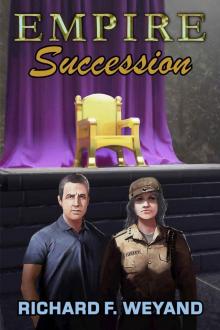 EMPIRE: Succession
EMPIRE: Succession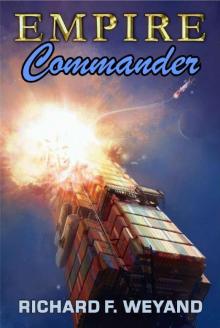 Commander
Commander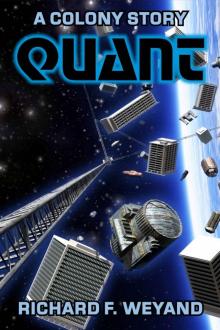 QUANT (COLONY Book 1)
QUANT (COLONY Book 1) EMPIRE: Renewal
EMPIRE: Renewal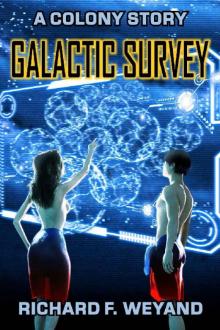 GALACTIC SURVEY (COLONY Book 3)
GALACTIC SURVEY (COLONY Book 3) Campbell- The Problem With Bliss
Campbell- The Problem With Bliss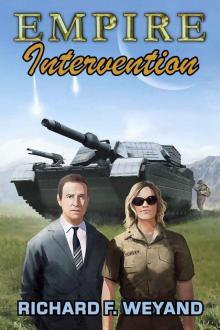 EMPIRE: Intervention (EMPIRE SERIES Book 13)
EMPIRE: Intervention (EMPIRE SERIES Book 13)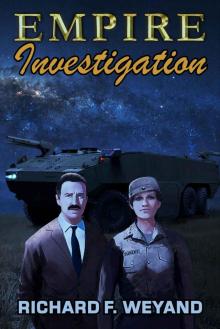 EMPIRE: Investigation
EMPIRE: Investigation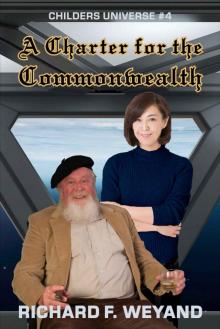 A Charter for the Commonwealth
A Charter for the Commonwealth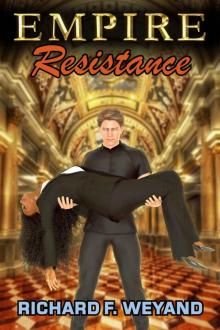 EMPIRE: Resistance
EMPIRE: Resistance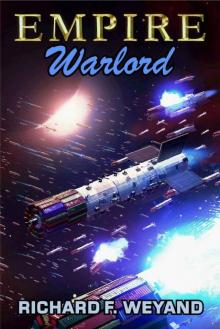 EMPIRE: Warlord (EMPIRE SERIES Book 5)
EMPIRE: Warlord (EMPIRE SERIES Book 5)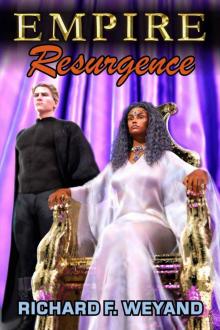 EMPIRE: Resurgence
EMPIRE: Resurgence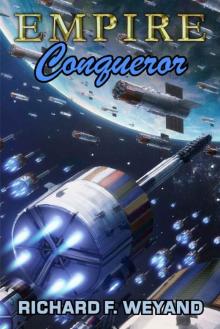 EMPIRE: Conqueror (EMPIRE SERIES Book 6)
EMPIRE: Conqueror (EMPIRE SERIES Book 6)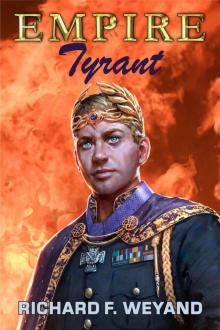 Tyrant
Tyrant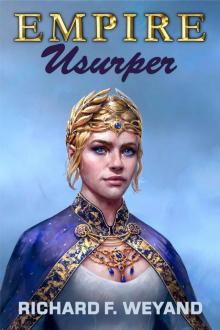 Usurper
Usurper Galactic Mail: Revolution! (Childers Universe Book 3)
Galactic Mail: Revolution! (Childers Universe Book 3) Galactic Mail_Revolution!
Galactic Mail_Revolution! Childers
Childers CHILDERS_Absurd Proposals
CHILDERS_Absurd Proposals